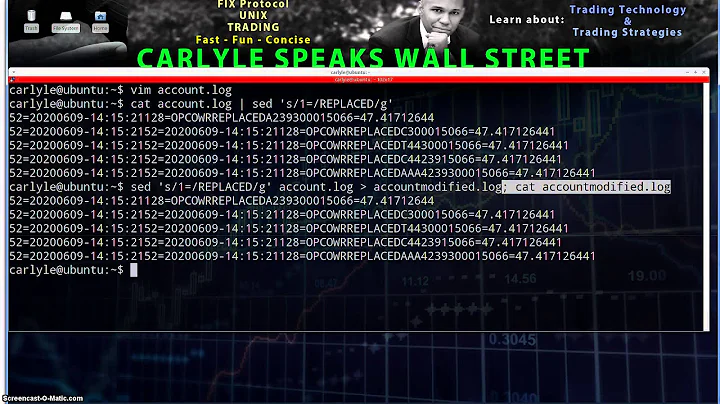Strip off word pattern at the end of string using sed
Solution 1
sed -e 's/& PID=\$\!;$//'
The $ toward the end anchors it to the end of the string.
Solution 2
All answers are good so far, but for this concrete example you can save your time and write a few characters less:
sed 's/ & [^ ]*$//'
or even better
sed 's/ & \S*$//'
Solution 3
To remove the last occurrence of a pattern on a line, you can just squeeze it.
sed 's/\(.*\)& PID=$!;/\1/'
That will match as much as possible in \1 before matching the string so it will always strip only the last occurrence - regardless of whether or not the string you strip is actually at the end of the line.
Your attempt:
sed 's/\(\& PID=\$\!\).*$//'
...does something like the opposite. It strips all characters on a line beginning with the first occurrence of your string and following on to the end of the line.
Remember the leftmost-longest rule - a regexp will always begin its match as far to the left in the string as it might and continue to match for as long as it might.
Note that if you want to remove just n last characters then with gnu sed
sed -E 's/.{9}$//'
Here -E option is necessary to use extended regular expressions.
Related videos on Youtube
Sas
I am a new grad software engineering student with big dreams. I consider myself an infant in programming, that does not mean I won't grow up. I enjoy every aspect of programming (coding, troubleshooting, bug fix, system design, etc). Quote: "Typing is no substitute for thinking." — Dartmouth Basic manual, 1964.
Updated on September 18, 2022Comments
-
 Sas over 1 year
Sas over 1 yearI have following string:
ksh -x SCRIPT2.ksh $BUSSINESSDATE & PID=$!; ksh -x SCRIPT1.ksh $BUSSINESSDATE & PID=$!;I want to strip off the last word
& PID=$!;. Desired result is:ksh -x SCRIPT2.ksh $BUSSINESSDATE & PID=$!; ksh -x SCRIPT1.ksh $BUSSINESSDATENote: that I do have
& PID=$!;in the middle of the string, I only need to get rid of the last word which contains& PID=$!;I am using
sedachieve this. But it doesn't seems to produce the expected output.sed 's/\(\& PID=\$\!\).*$//'-
 Costas over 9 yearsTry
Costas over 9 yearsTrysed 's/& PID=$!;\s*$//' -
 Sas over 9 years@Costas It works. But wondering what does "\s" in the middle does in your command?
Sas over 9 years@Costas It works. But wondering what does "\s" in the middle does in your command? -
 janos over 9 years
janos over 9 years\s*is zero or more white-space characters. You might not need it. It seems Costas was being extra careful.
-
-
jimmij over 9 years@mikeserv
.{9}$is only 5, so definitely the best one! :) -
 mikeserv over 9 years@jimmij - you should probably give up the
mikeserv over 9 years@jimmij - you should probably give up the-rhabit. The-Esyntax is compatible with GNU and BSDseds and should be POSIX as well if/when this ever takes effect. -
jimmij over 9 yearsYes, probably. But
-Eis not documented neither inmannor ininfo, at least for my GNU sed version 4.2.1. -
 mikeserv over 9 years@jimmij - yup, that remains an undocumented feature*(?)*. And it actually is slightly less capable - as near as I can tell the only thing you can do with
mikeserv over 9 years@jimmij - yup, that remains an undocumented feature*(?)*. And it actually is slightly less capable - as near as I can tell the only thing you can do with-rthat you cannot do w/-Eis switch from a BRE context to an ERE context. With-ryou can dosed -e 's/BREhere\(.*\)/w \1 portable backrefs/' -er 's/(nowERE).*/and \1 backrefs only as a non-POSIX extension/'. While the backrefs w/ ERE still work w/-Eyou can't switch from BRE to ERE like that. And even w/-ryou can't switch back to a BRE context anyway.







